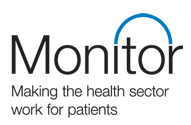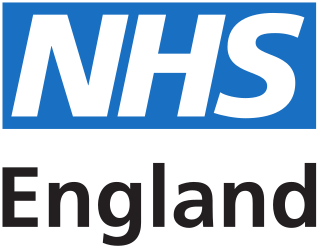
Monitor was an executive non-departmental public body of the Department of Health, responsible between 2004 and 2016 for ensuring healthcare provision in NHS England was financially effective. It was the sector regulator for health services in England. Its chief executive was Ian Dalton and it was chaired by Dido Harding. Monitor was merged with the NHS Trust Development Authority to form NHS Improvement on 1 April 2016.
Health and wellbeing boards are statutory bodies introduced in England under the Health and Social Care Act 2012, whose role is to promote integrated working among local providers of healthcare and social care.
Healthcare in the city of Bristol, England and the surrounding area is largely provided by the National Health Service (NHS). Until July 2022, this was provided through the Bristol, North Somerset and South Gloucestershire clinical commissioning group. Facilities include a large teaching hospital – Bristol Royal Infirmary – which offers nationally commissioned specialist cardiac, cancer and children's services from its city-centre campus to patients in the southwest of England and beyond.

Clinical commissioning groups (CCGs) were National Health Service (NHS) organisations set up by the Health and Social Care Act 2012 to organise the delivery of NHS services in each of their local areas in England. On 1 July 2022 they were abolished, and replaced by Integrated care systems as a result of the Health and Care Act 2022.

Virgin Care was a private provider of community health and social services in parts of the UK, commissioned by the National Health Service and by local authorities in England. From 2010 the company was known as Virgin Care and was part of Virgin Group. In December 2021, it was acquired by Twenty20 Capital and rebranded as HCRG Care Group.

NHS England, officially the NHS Commissioning Board, is an executive non-departmental public body of the Department of Health and Social Care. It oversees the budget, planning, delivery and day-to-day operation of the commissioning side of the National Health Service in England as set out in the Health and Social Care Act 2012. It directly commissions NHS general practitioners, dentists, optometrists and some specialist services. The Secretary of State publishes annually a document known as the NHS mandate which specifies the objectives which the Board should seek to achieve. National Health Service Regulations are published each year to give legal force to the mandate.
The English national framework for NHS continuing healthcare came into force on 1 October 2007 as a development in the light of the case of Coughlan which established that where a person's need is primarily for health care then the health service must fund the whole cost of nursing home placement. People who qualify are entitled to care paid for by the NHS, for which they do not have to pay, rather than social care, which is means-tested. Most of those who qualify need nursing home care. It is in the interests of local social services departments to establish entitlement to continuing healthcare as this relieves them of any financial responsibility. This system has existed in one form or another since the creation of the NHS.
Healthcare in Devon was the responsibility of two clinical commissioning groups until July 2022, one covering Northern, Eastern and Western Devon, and one covering South Devon and Torbay. It was announced in November 2018 that the two were to merge.
Patient choice is a concept introduced into the NHS in England. Most patients are supposed to be able to choose the clinician whom they want to provide them with healthcare and that money to pay for the service should follow their choice. Before the advent of the internal market, in principle, a GP could refer a patient to any specialist in the UK. When contracts were introduced in 1990 these were called extracontractual referrals. From 1999 the concept of Out of Area Treatments was developed. These referrals were not necessarily related to choice made by a patient. Specialised treatments were not, and are not, available in every area.
Healthcare in Worcestershire was the responsibility of three Clinical Commissioning Groups until July 2022, covering, respectively Redditch and Bromsgrove, Wyre Forest and South Worcestershire.

Healthcare in Kent has, from 1 July 2022, been mainly the responsibility of the Kent & Medway Integrated Care Board. Certain specialised services are directly commissioned by NHS England, coordinated through the South East integrated regional team. Some NHS England structures are aligned on a Kent and Medway basis, others on a South East basis and there is liaison with London to provide many tertiary healthcare services.
Healthcare in Bedfordshire is the responsibility of Bedfordshire and Luton Integrated Care Systems.
Healthcare in Sussex was the responsibility of seven Clinical Commissioning Groups covering: Brighton and Hove; Coastal West Sussex; Horsham and Mid Sussex; Crawley; Eastbourne Hailsham and Seaford; Hastings and Rother; High Weald; and Lewes-Havens from 2013 to 2020. From April 2020 they were merged into three covering East Sussex, West Sussex, and Brighton and Hove. In 2021 the three Sussex CCGs were merged into one, Sussex CCG. In 2022 Sussex CCG transitioned into an Integrated Care Board or ICB.
Healthcare in Staffordshire was the responsibility of six clinical commissioning groups until July 2022, covering Stafford & Surrounds, North Staffordshire, South East Staffordshire and Seisdon Peninsula, East Staffordshire, Cannock Chase, and Stoke-on-Trent.
The "Greater Manchester Model" of NHS health care was a system uniquely devolved within England, by way of close integration with the Greater Manchester Combined Authority and local authorities, led by the Mayor of Greater Manchester. In July 2022 the Greater Manchester integrated care system took over responsibility for health and social care in the conurbation. The financial plan for 2022–23 had an initial shortage of £187 million.
Healthcare in Cambridgeshire was the responsibility of NHS Cambridgeshire and Peterborough Clinical Commissioning Group until July 2022. This was one of the largest in the United Kingdom.
Healthcare in Essex is now the responsibility of six clinical commissioning groups: Basildon and Brentwood, Mid Essex, North East Essex, Southend, Thurrock and West Essex.
Healthcare in Norfolk was the responsibility of five clinical commissioning groups: Great Yarmouth and Waveney CCG, Norwich CCG, North Norfolk CCG, West Norfolk CCG and South Norfolk CCG, they merged in April 2020 becoming the Norfolk and Waveney CCG until they were replaced by an integrated care system in July 2022. Social Care is the responsibility of Norfolk County Council.

Professor Nick Harding OBE BSc FRCGP FRCP HonMFPH DRCOG DOccMed PGDIP (Cardiology) SFFLM, born 21 December 1969, is a British general practitioner and Chief Medical Officer at Operose Health.
Practice Plus Group is a healthcare company based in Reading, Berkshire, which is England's largest independent provider of NHS services.






